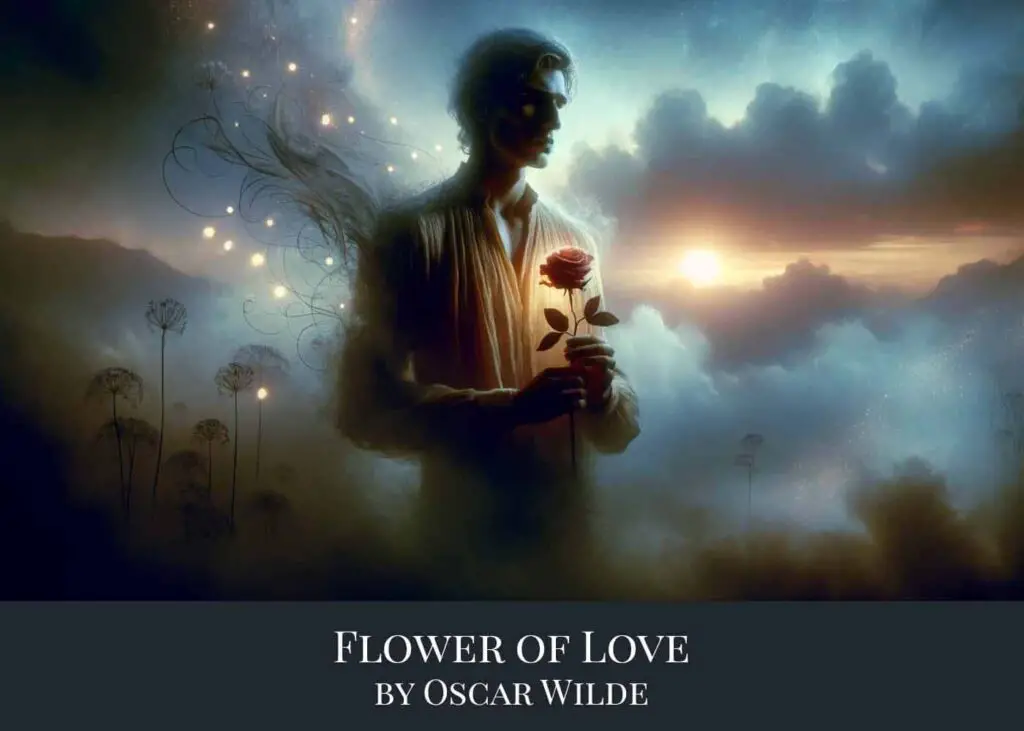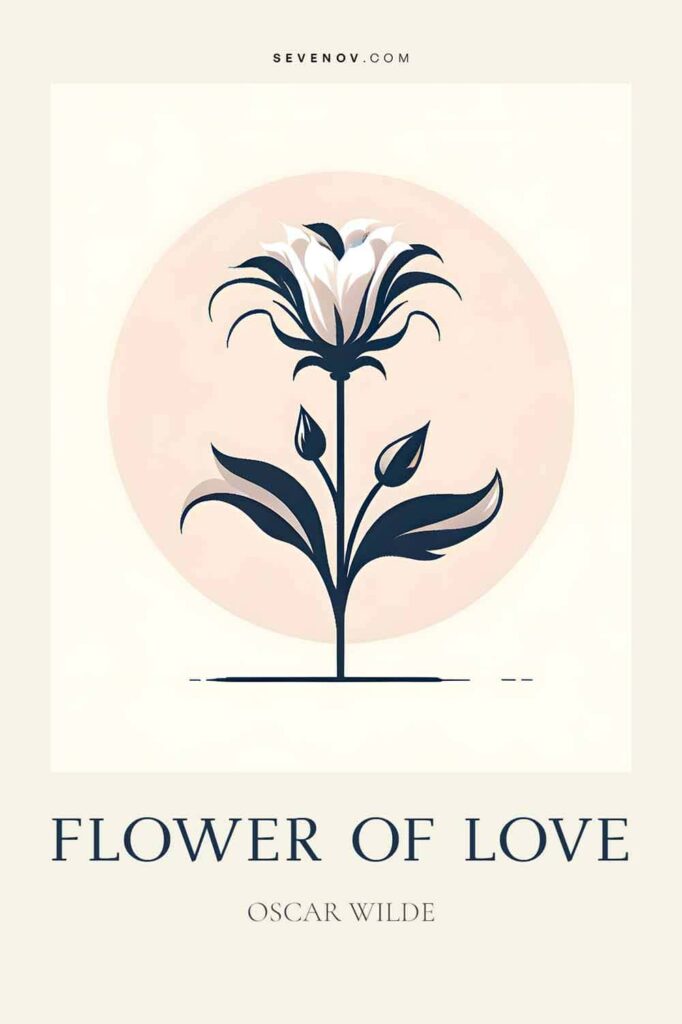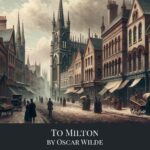
Flower of Love by Oscar Wilde
“Flower of Love” by Irish playwright, writer, and poet Oscar Wilde is a deeply reflective and emotive poem that explores the themes of love, regret, and the passage of time. In this poem, Wilde delves into the personal cost of love and its impact on the creative and aspirational aspects of life. He expresses a sense of loss over unfulfilled potential, contemplating what might have been achieved if not for the distractions of love. Yet, despite these reflections, the poem conveys a tone of acceptance and even a subtle appreciation for the experiences love has brought.
“Flower of Love” is included in Oscar Wilde’s Poems, a collection that showcases Wilde’s prowess in poetry, marked by his characteristic depth, lyricism, and eloquent expression. Those interested in exploring more of Wilde’s poetic works can find Poems available online at PageVio.
1. The Poem
Sweet, I blame you not, for mine the fault
was, had I not been made of common clay
I had climbed the higher heights unclimbed
yet, seen the fuller air, the larger day.
From the wildness of my wasted passion I had
struck a better, clearer song,
Lit some lighter light of freer freedom, battled
with some Hydra-headed wrong.
Had my lips been smitten into music by the
kisses that but made them bleed,
You had walked with Bice and the angels on
that verdant and enamelled mead.
I had trod the road which Dante treading saw
the suns of seven circles shine,
Ay! perchance had seen the heavens opening,
as they opened to the Florentine.
And the mighty nations would have crowned
me, who am crownless now and without name,
And some orient dawn had found me kneeling
on the threshold of the House of Fame.
I had sat within that marble circle where the
oldest bard is as the young,
And the pipe is ever dropping honey, and the
lyre’s strings are ever strung.
Keats had lifted up his hymeneal curls from out
the poppy-seeded wine,
With ambrosial mouth had kissed my forehead,
clasped the hand of noble love in mine.
And at springtide, when the apple-blossoms
brush the burnished bosom of the dove,
Two young lovers lying in an orchard would
have read the story of our love;
Would have read the legend of my passion,
known the bitter secret of my heart,
Kissed as we have kissed, but never parted as
we two are fated now to part.
For the crimson flower of our life is eaten by
the cankerworm of truth,
And no hand can gather up the fallen withered
petals of the rose of youth.
Yet I am not sorry that I loved you—ah!
what else had I a boy to do,—
For the hungry teeth of time devour, and the
silent-footed years pursue.
Rudderless, we drift athwart a tempest, and
when once the storm of youth is past,
Without lyre, without lute or chorus, Death
the silent pilot comes at last.
And within the grave there is no pleasure,
for the blindworm battens on the root,
And Desire shudders into ashes, and the tree
of Passion bears no fruit.
Ah! what else had I to do but love you?
God’s own mother was less dear to me,
And less dear the Cytheræan rising like an
argent lily from the sea.
I have made my choice, have lived my
poems, and, though youth is gone in wasted days,
I have found the lover’s crown of myrtle better
than the poet’s crown of bays.

Download Flower of Love Poster
Size: 8″ x 12″ (2:3 ratio)
Format: PDF
Copyright information: For personal use only
Note: Actual poster background color is white. For the sample poster, the background is made gray for illustration purpose.
2. Flower of Love Analysis
“Flower of Love” expresses a deep sense of regret and reflection on love, creativity, and the passage of time. It seems to speak from the perspective of someone who has loved deeply and feels that this love, while enriching, has also diverted him from achieving greater heights in other realms, particularly in artistic or intellectual pursuits. Here’s a breakdown of its themes and content:
Personal Fault and Lost Potential
The speaker begins by addressing a loved one, stating that it is his fault, not the loved one’s, that he has not achieved greater things (“had I not been made of common clay”). He believes that if not for this ‘common’ nature, he might have achieved more significant accomplishments.
Wasted Passion and Missed Opportunities
The speaker reflects on how his intense passion could have led to greater achievements in art or battle against wrongs (“struck a better, clearer song,” “battled with some Hydra-headed wrong”). He regrets that his emotional experiences didn’t translate into more profound creative expressions or actions.
References to Dante and Keats
The speaker imagines a path similar to Dante’s, seeing divine visions or reaching the heights of fame as Dante did in his works. He also envisions a kinship with John Keats, wishing for recognition and connection in the realm of great poets.
Love’s Transience and Youth’s Fleeting Nature
The poem laments the ephemeral nature of youth and love. The speaker acknowledges that the “crimson flower” of his life has been affected by the harsh truth of reality and time, with no way to regain the lost vitality of youth.
Acceptance of Love Despite Its Cost
Despite the recognition of what was lost due to love, the speaker doesn’t regret his love. He views it as an inevitable part of youth. The imagery of a storm and Death as a silent pilot suggests an acceptance of life’s uncontrollable nature and the inevitable end that comes for all.
The Finality of Death and the End of Desire
The poem reflects on the inevitability of death and the cessation of all passions and desires in the grave, indicating a melancholic acceptance of mortality.
Personal Choice and Its Consequences
The speaker states that he has made his choice to love and live through his emotions (“have lived my poems”). He finds the “lover’s crown of myrtle” (symbolizing love) more fulfilling than the “poet’s crown of bays” (symbolizing artistic glory).
Conclusion
The poem concludes with a poignant sense of acceptance. The speaker acknowledges the trade-offs made between love and other forms of achievement or recognition, suggesting that while he may have lost in terms of fame or artistic accomplishment, the experience of love was, for him, ultimately more valuable.
In summary, the poem grapples with the tension between love and personal ambition, the inevitable loss that comes with time, and the acceptance of the choices made in life, even when they lead to unfulfilled potential in other areas. It’s a meditation on the values and consequences of the paths we choose in life.
3. Conclusion
We hope Oscar Wilde’s “Flower of Love” has struck a chord with you. Discover more of Oscar Wilde’s poetry on Sevenov.




